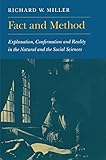Fact and Method : Explanation, Confirmation and Reality in the Natural and the Social Sciences / Richard W. Miller.
Material type: TextPublisher: Princeton, NJ : Princeton University Press, [2021]Copyright date: ©1988Description: 1 online resource (628 p.)Content type:
TextPublisher: Princeton, NJ : Princeton University Press, [2021]Copyright date: ©1988Description: 1 online resource (628 p.)Content type: - 9780691228365
- Causation
- Positivism
- Realism
- Science -- Philosophy
- PHILOSOPHY / Epistemology
- Aristotelian science
- Bayesianism
- Bayes’ Theorem
- Bernoulli process
- Bertrand’s paradox
- Boyle-Charles law
- Copenhagen interpretation
- Hamiltonian operator
- King Lear
- Marxist social theory
- Nazi seizure of power
- acceptance
- anomalies
- antirealism
- approximate truth
- atomic theory
- caloric
- cat paradox
- causal checklists
- chemistry
- comparison
- counterfactual conditionals
- covering-law model
- de Broglie equation
- determinism
- disease theory
- dogmatism
- dutch book
- economics
- eigenstate
- electrodynamics
- empathy
- entelechies
- entrenchment
- explanation sketch
- fictionalism
- frameworks
- functional explanation
- hermeneutics
- historical explanation
- hypothetico-deductive confirmation
- likelihood
- literary theory
- lottery paradox
- molecular-kinetic theory
- objective interests
- phlogiston
- pragmatics of explanation
- probability amplitude
- projectibility
- renormalization
- separability
- 121
- online - DeGruyter
| Item type | Current library | Call number | URL | Status | Notes | Barcode | |
|---|---|---|---|---|---|---|---|
 eBook
eBook
|
Biblioteca "Angelicum" Pont. Univ. S.Tommaso d'Aquino Nuvola online | online - DeGruyter (Browse shelf(Opens below)) | Online access | Not for loan (Accesso limitato) | Accesso per gli utenti autorizzati / Access for authorized users | (dgr)9780691228365 |
Browsing Biblioteca "Angelicum" Pont. Univ. S.Tommaso d'Aquino shelves, Shelving location: Nuvola online Close shelf browser (Hides shelf browser)

|

|

|

|

|

|

|
||
| online - DeGruyter Diversity and Its Discontents : Cultural Conflict and Common Ground in Contemporary American Society / | online - DeGruyter Solo in the New Order : Language and Hierarchy in an Indonesian City / | online - DeGruyter Judaism, Christianity, and Islam: The Classical Texts and Their Interpretation, Volume II : The Word and the Law and the People of God / | online - DeGruyter Fact and Method : Explanation, Confirmation and Reality in the Natural and the Social Sciences / | online - DeGruyter Poisoning the Minds of the Lower Orders / | online - DeGruyter Schools of Thought : Twenty-Five Years of Interpretive Social Science / | online - DeGruyter Civil Society and Government / |
Frontmatter -- CONTENTS -- ACKNOWLEDGMENTS -- INTRODUCTION. Replacing Positivism -- PART ONE: Explanation -- CHAPTER ONE. Explanation: The Covering-Law Model -- CHAPTER TWO. The Nature of Explanation -- CHAPTER THREE. Applications -- PART TWO: Confirmation -- CHAPTER FOUR. Confirmation as Causal Comparison -- CHAPTER FIVE. Deductivism: Plain and with Simplicity -- CHAPTER SIX. The New Positivism -- CHAPTER SEVEN. Anti-Bayes -- PART THREE: Realism -- CHAPTER EIGHT. The Issue of Realism -- CHAPTER NINE. Learning from Anti-Realism -- CHAPTER TEN. A Defense of Realism -- CHAPTER ELEVEN. Quantum Reality -- INDEX
restricted access online access with authorization star
http://purl.org/coar/access_right/c_16ec
In this bold work, of broad scope and rich erudition, Richard Miller sets out to reorient the philosophy of science. By questioning both positivism and its leading critics, he develops new solutions to the most urgent problems about justification, explanation, and truth. Using a wealth of examples from both the natural and the social sciences, Fact and Method applies the new account of scientific reason to specific questions of method in virtually every field of inquiry, including biology, physics, history, sociology, anthropology, economics, psychology, and literary theory. Explicit and up-to-date analysis of leading alternative views and a wealth of examples make it an ideal introduction to the philosophy of science, as well as a powerful attempt to change the field. Like the works of Hempel, Reichenbach, and Nagel in an earlier generation, it will challenge, instruct, and help anyone with an interest in science and its limits.For the past quarter-century, the philosophy of science has been in a crisis brought on by the failure of the positivist project of resolving all basic methodological questions by applying absolutely general rules, valid for all fields at all times. Professor Miller presents a new view in which what counts as an explanation, a cause, a confirming test, or a compelling case for the existence of an unobservable is determined by frameworks of specific substantive principles, rationally adopted in the light of the actual history of inquiry. While the history of science has usually been the material for relativism, Professor Miller uses arguments of Darwin, Newton, Einstein, Galileo, and others both to undermine positivist conceptions of rationality and to support the positivists' optimism that important theoretical findings are often justifiable from all reasonable perspectives.
Mode of access: Internet via World Wide Web.
In English.
Description based on online resource; title from PDF title page (publisher's Web site, viewed 01. Dez 2022)


